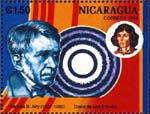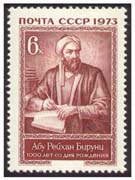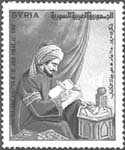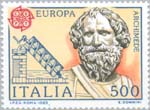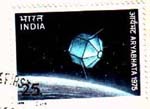|
|
A
Niels Henrik Abel (1802-1829) was a Norwegian mathematician of great talent whose work was in analysis and elliptic functions. He proved that it was impossible to solve algebraically an equation of the fifth degree. Always poor, he died of tuberculosis at an early age, just before the news of an important appointment in Berlin could reach him.
Airy served as astronomer royal and director of the Greenwich Observatory from 1835 to 1881. He graduated as Senior Wrangler from Cambridge in 1823 and at one time holding the Lucasian professorship (Barrow and Newton were the first and second holders of the Lucasian Chair at Cambridge). Undergraduates come across Airy's name in the first course in differential equations through Airy's equation y''- xy = 0. The equation is interesting in that solutions are monotone for positive values of x and oscillatory for negative values.
Al-Biruni, mathematician, astronomer and philosopher is considered as one of the very greatest scientists of Islam.
One of the first who translated Euclids Elements in Arabic
Born: about 801 in Kufah, Iraq
The image of Archimedes represented on the stamp is from a bust in the National Museum of Naples, Italy. However, the bust actually is one of Archidamos III, a third-century BC king of Sparta.
Considered to be one of the greatest mathematicians ever together with Newton and Gauss.
Aristotle was born at Stageira (or Stagira) on the peninsula Chalcidike. His parents were the physician Nicomachus (working for the Macedonian King Amyntas II) and Phaestis (his mother who died when he was a child). At the age around ten also his father died and the orphan Aristotle lived with his uncle Proxenus of Atarneus who was also his teacher in rhetoric and poetry. At the age of 18 he went to Athens where he was a student of Plato working later in the Academy until the death of his teacher. Probably he was dissapointed that not he but Speusippus, the newphew of Plato, was appointed as the next director of the Academy after Plato and so he left Athens and he went to the court of Hermias in Asia Minor. There he worked for around three years until the death of Hermias. He went for 1-2 years to Lesbos (where he did some biological research) and returned to Stageira after King Philip II asked him to work as a teacher of his son Alexander the Great. Aristotle returned to Athens after Alexander started his expedition against Persia. He opened a school in Athens which was dedicated to Apollo Lykeios and for this reason known as the Lyceum (also known as the Peripatic School because Aristotle prefered to discuss problems walking with his students and others). After the death of Alexander the Great he left Athens since some Athenians were against Alexander and again Aristotle who was supported financially by Alexander. Aristotle went to Chalkis / Euboea (the birthplace of his mother), where he died one year later. His original books, written mainly in the period of the Lyceum, some in the form of dialogues, all lost. His work is mainly from lecture notes compiled by his students. For some period these written manuscripts were hidden in caves and with some modifications almost 2 centuries after his death a collection, known as Corpus Aristotelicum published that contains probably also some additional work of students of his school. Aristotle had a child, Nicomachus, with Herpyllis, his second wife after his first wife Pythias, the niece of Hermias, died during the Lyceum years. Reading the parts of his work that survived we understand why Aristotle was one the most important universal scientists of all time (if not the most important). His work was almost forgotten because his ideas about God (The unmoved mover) were not conformal to Christian religion as that of Plato. Around the 12th century again he was rediscovered and his work was recognized and scholars transformed his ideas almost into a religion. The irony is that Aristotle was considered responsible that his wrong ideas delayed the development of science. The scholars did not apply the method of Aristotle to start with a review of the work of others with comments which ideas and why are wrong, a method usually followed in every scientific publication today. Most of his errors (but not only) were about physical /natural phenomena. Only more than 1500 years after Aristotle's death real experiments were performed.
Info in Preparation
About 1000, Ibn Sina, or Avicenna, hypothesized two causes of mountains: "Either they are the effects of upheavals of the crust of the earth, such as might occur during a violent earthquake, or they are the effect of water, which, cutting itself a new route, has denuded the valleys, the strata being of different kinds, some soft, some hard.... It would require a long period of time for all such changes to be accomplished, during which the mountains themselves might be somewhat diminished in size" (Toulmin and Goodfield 1965:64). In Kitah al-Shifa, he denied the Aristotelian notion that an object thrown through the air is pushed by that air and held that "every motion occurs through a power in the moving object by which it is impelled" (Avicenna, quoted in Pines 1975:141). He also published Al-Quanun, or Canon of Medicine, where he held that medicines were to be known either by experiment or by reasoning. When one of his patients claimed he was a cow and bellowed like one, Avicenna told him that a butcher was coming to slaughter him. The patient was bound hand and foot, then Avicenna said he was too thin and had to be fattened first. The patient was untied and began to eat enthusiastically, gained strength, gave up the delusion and was cured.
|
|
|||||
|
|

